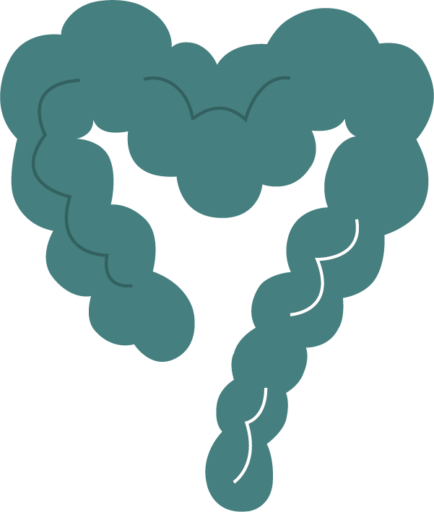
Diagnosis of IBS
The symptoms of IBS are entirely harmless but very uncomfortable to live with as they often impact daily life. Life with IBS can also vary depending on the symptoms one experiences. Some may have mild gas issues, while others may find it challenging to leave their homes. The average time for an IBS diagnosis is seven years.
Diagnosing IBS
There are criteria for diagnosing IBS, and it’s common for a doctor to make the diagnosis after testing for lactose and gluten intolerance. Sometimes, the doctor may conduct endoscopic examinations of the intestines (gastroscopy or colonoscopy). Lactose is tested through a blood test or a hydrogen breath test. Blood tests are more common today, but they only show if you have the genotype for lactose intolerance and are not entirely reliable.
Some doctors diagnose IBS without testing. However, it’s crucial to exclude inflammatory bowel disease (IBD) like Crohn’s and Ulcerative Colitis. Colonoscopy is particularly essential for those with alarm symptoms like fever, blood in the stool, and involuntary weight loss, as these are not typical IBS symptoms and require further investigation before treatment. It’s not necessary to have a formal diagnosis before trying the low FODMAP diet.
We always recommend a gluten test before starting the low FODMAP diet. Since the intake of cereals decreases with a low FODMAP diet, antibodies against gluten may disappear, affecting the reliability of the test.
What happens after the doctor's visit?
What happens after the doctor’s visit varies. Some doctors refer patients to a dietitian, while others provide dietary advice themselves or suggest that the patient must live with the diagnosis. In the UK, we efficiently work with IBS where patients without alarm symptoms (blood in the stool, involuntary weight loss, or fever) first undergo dietary treatment. Those who do not improve may undergo additional examinations by a gastroenterologist, such as endoscopic examinations of the rectum or colon, known as colonoscopy, magnetic resonance imaging, or ultrasound.
Types of IBS diagnoses
There are several types of functional gastrointestinal issues, and within each category, there are subgroups. IBS is one of these subgroups and is among the most common. Even IBS has its subgroups, which may not be widely known. If you haven’t visited a doctor for your issues yet, it’s always a good idea to do so first. A skilled doctor will want to know more about your symptoms to provide a more specific diagnosis and, most importantly, treatment.
Not all doctors use or are aware of the different diagnostic groups, so don’t be alarmed if your doctor says you “only have IBS.” However, it’s good to know which group you belong to because the advice for each group differs slightly. Most, regardless of IBS type, experience reduced symptoms with the low FODMAP diet. Beyond that, some foods are better for different conditions.
Constipation-predominant IBS (IBS-C)
IBS-C (C for constipation) is characterized by constipation that can last from days to over a week. Symptoms of IBS-C include irregular bowel movements (less frequent than every third day), lumpy or hard stool (Bristol stool chart types #1 or #2), and the need to strain during bowel movements. If you have IBS-C, you might have been advised to eat more fibre. While increasing fibre can help, it’s crucial to choose the right kind not to worsen constipation. The the low FODMAP diet teaches you which types of fibre are good for the gut.
Diarrhoea-predominant IBS (IBS-D)
IBS-D (D for diarrhoea) is characterised by loose or watery stools. Additionally, you should have the following symptoms: frequent toilet visits, loose or watery stools (Bristol Stool chart types #5, #6, or #7), and a need to quickly go to the toilet. Having IBS-D means the intestines work faster than usual, resulting in faster passage of food. Undigested food may also appear in the stool. Since the intestines work faster, those with IBS-D may benefit from avoiding stimulating substances like coffee, alcohol, and nicotine. Avoid them for a while and see how they affect your symptoms. If you improve, you can try reintroducing them in small doses. In severe cases of IBS with diarrhoea, attention to certain nutrient deficiencies like B12 and iron may be necessary.
Mixed IBS (IBS-M), a combination of IBS-D and IBS-C?
Most people have a predominantly dominant type of stool most of the time, but it’s not uncommon to be constipated for a while and then have diarrhea. In such cases, you likely have IBS-M. Some also experience changing IBS symptoms throughout life, going from constipation to looser stools or vice versa. Those with mixed bowel habits can try the low FODMAP diet and also consider a bulk-forming agent like psyllium seed Husk or Fybogel.
The distribution in diagnostic groups is even, with approximately 30% in each. By keeping a food and symptoms diary, you can better understand your bowel habits, identify your group, and make informed decisions when discussing medical treatment with your doctor and, of course, when finding advice that suits your gut best.
PI-IBS
Post-infectious IBS (PI-IBS) is a term for the approximately 10% who develop IBS after a gastrointestinal infection. The gut never fully recovers, and symptoms persist, sometimes for as long as 6-7 years. Research shows that the interplay between the immune system and gut bacteria is altered in people with PI-IBS. After the infection, the immune system mistakenly reacts to bacteria naturally present in the intestine. We have an in-depth article on PI-IBS if you want to know more. The good news is that with the low FODMAP diet most people with PI-IBS could recover more quickly.
IBS or IBD?
IBS (Irritable Bowel Syndrome) and IBD (Inflammatory Bowel Disease) are two common medical diagnoses that are easy to confuse. To get the right treatment, it’s important to understand whether you have IBS or IBD, as they are two different gastrointestinal conditions with different treatments. If you have any of the alarm symptoms we advice you to seek further medical help before starting the low FODMAP diet.
Sofia Antonsson
Dietitian, Belly Balance
Take control of your IBS today!
Ready to reclaim your life from IBS? Our app provides the tools and guidance you need to manage IBS effectively.
Download the App



